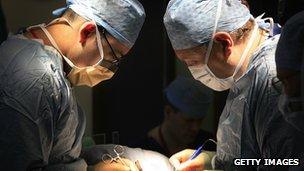NHS care, including knee and hip operations, 'rationed'
- Published

GP magazine received responses from two thirds of trusts
Access to NHS care - including knee and hip operations - is being restricted, data from trusts in England suggests.
The evidence, gathered under the Freedom of Information Act by GP magazine, showed 90% of trusts were imposing restrictions.
The trend was blamed on cost-cutting by some, but the government says there was no justification for that assertion.
NHS managers have defended the practice, saying there were instances when care had to be prioritised.
The magazine received responses from two-thirds of the 151 trusts about the procedures they considered to be non-urgent.
The most common restriction was on tonsillectomies, with 89% of areas rationing the availability of this procedure.
That, in itself, is not that controversial, as many argue the NHS is better to concentrate its resources in most cases on other, more serious conditions.
But the research also found evidence of rationing in other areas.
Limits on cataract surgery were in place in 66% of trusts, while more than half of trusts were rationing weight-loss surgery and hip and knee operations.
Another survey published by Labour found similar patterns, prompting criticism of the trust's actions from patient groups.
Clara Eaglen, of the Royal National Institute of Blind People, said: "People should not have to live with a reduced quality of life simply because PCTs are using arbitrary criteria to determine whether they get to keep their sight."
Dr Richard Vautrey, of the British Medical Association, described the situation as a "cost-saving exercise".
"Patients fully understand the NHS doesn't have unlimited resources... but they don't understand, or believe it's fair, when services are provided in one area but not another.
"We're supposed to have a national health service, so there should be national consistency in service availability."
Dr Richard Vautrey, BMA GP committee: Patients need to be treated the same wherever they are in the UK
Health minister Simon Burns described such practices as "unacceptable".
"If local health bodies stop patients from having treatments on the basis of cost alone, we will take action against them."
But David Stout, of the NHS Confederation, which represents primary care trusts, said there were sometimes justifiable reasons for rationing.
He said while arbitrary restrictions should not be put in place, trusts had to prioritise care in the current environment and make sure they got the best value available.
"The NHS faces considerable financial pressures and scarce resources have to be used as effectively as possible."
He said most advice given to trusts by the National Institute of Clinical Excellence (Nice) - which is employed to make cost-effective recommendations - was "just advice".
Trusts should not be trying to do everything Nice suggested, he added.
- Published22 May 2012
- Published12 June 2012
- Published24 May 2012
- Published15 May 2012
- Published23 June 2010